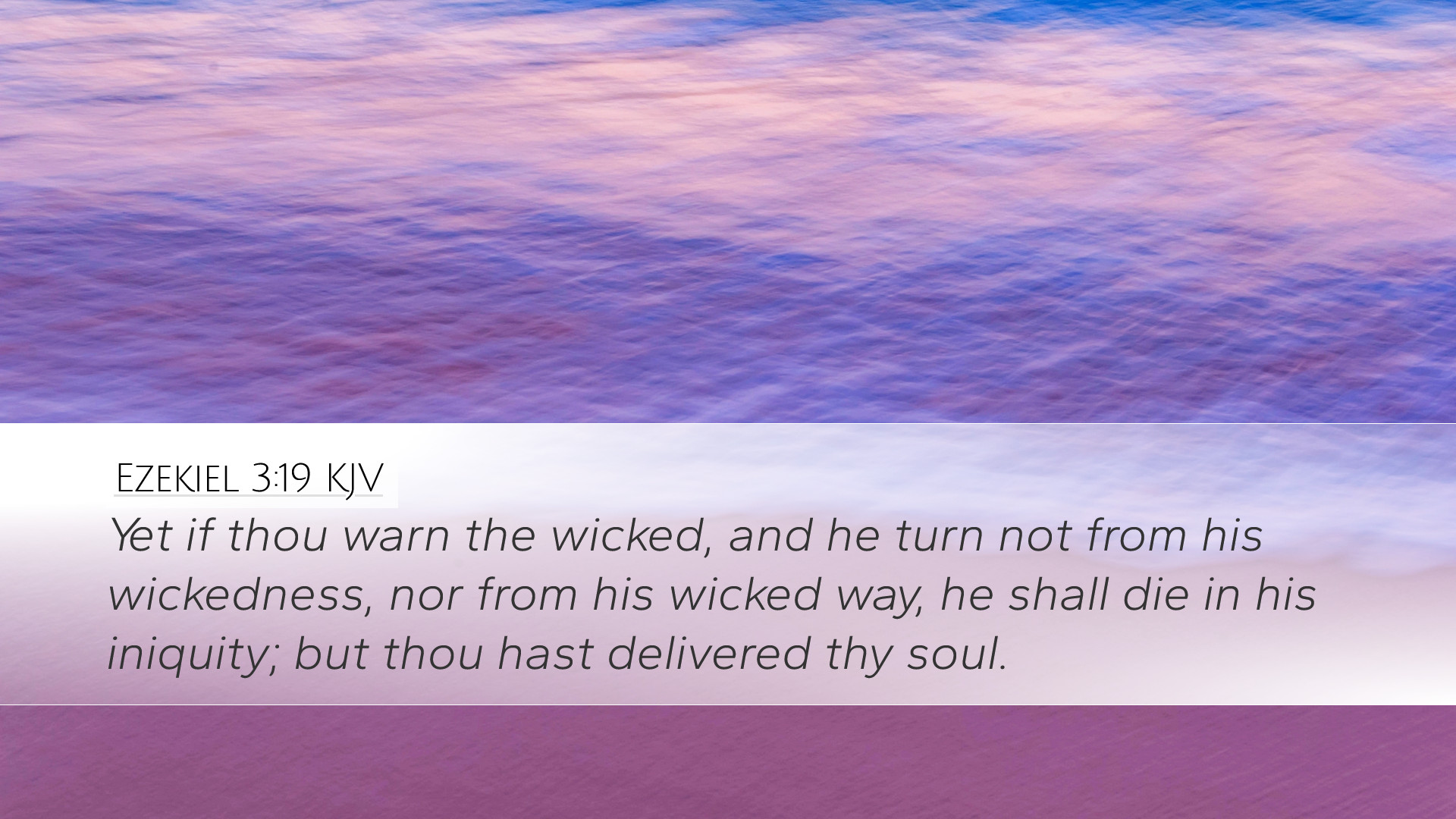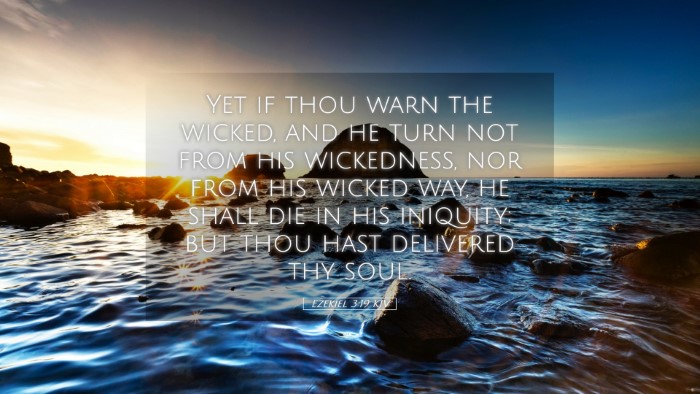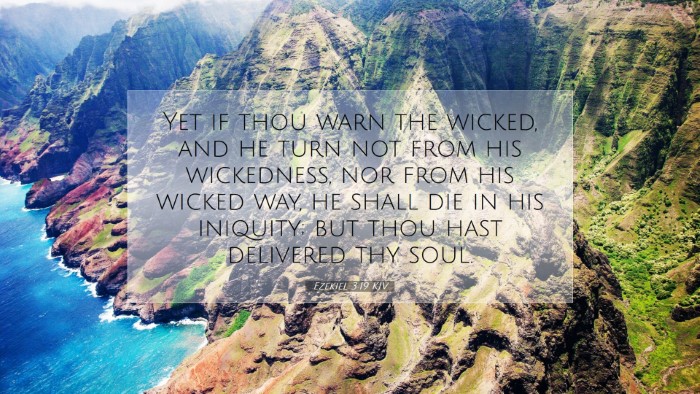Commentary on Ezekiel 3:19
Ezekiel 3:19 states:
"Yet if you warn the wicked, and he does not turn from his wickedness, nor from his wicked way, he shall die in his iniquity; but you have delivered your soul."
Introduction
The prophet Ezekiel carries a heavy burden as a watchman for the house of Israel. This verse encapsulates the essential duty of the prophet while illustrating the profound implications of disobedience and the nature of accountability. This commentary synthesizes insights from various public domain sources, focusing on the theological, pastoral, and practical implications for contemporary ministry.
The Role of the Watchman
Ezekiel is appointed as a watchman, a recurring theme in the prophetic literature. As Matthew Henry notes, a watchman is tasked with watching over a community, alerting them to danger, and calling them to repentance. This role underscores the responsibility of prophets (and by extension, leaders) to convey God’s messages faithfully.
Albert Barnes emphasizes that the watchman has no control over the response of the people. His responsibility lies solely in delivering the message. If the watchman fails to warn the wicked, he bears the weight of their blood on his conscience. Conversely, if he warns them and they reject the warning, their demise rests on their own shoulders.
Divine Accountability
This verse prominently speaks to the concept of accountability before God. Clarke elaborates on this by explaining that each individual is accountable for their actions. The wicked who receive warning yet choose not to turn from their ways face divine judgment. However, the prophet’s duty is fulfilled, and he is acquitted of any guilt regarding their fate.
Implications for Leadership
In pastoral contexts, this verse serves as a sobering reminder of the gravity of teaching and preaching. Leaders are called to confront sin and illuminate truth, echoing Paul’s exhortation to Timothy to preach the word (2 Timothy 4:2). As noted by Henry, there is a fine balance between compassion and conviction. The watchman's message, while intended to bring repentance, can also incite resistance among those unwilling to change.
Understanding Wickedness
The ‘wicked’ in this context refers to those who live in opposition to God’s commandments. This term is not just a label but describes a state of being characterized by persistent refusal to heed God’s warnings. Barnes indicates that the inability to turn from one’s wickedness is a refusal of God's mercy and a rejection of His grace.
The Nature of Warning
The act of warning is an expression of divine love. It is God’s desire that none shall perish (2 Peter 3:9). This verse highlights that the warning is not just an announcement of judgment; it is an opportunity for repentance. The effectiveness of a warning can vary based on the will of the recipient, as emphasized by Clarke. The sovereignty of God is balanced with human response in this dynamic of salvation.
Consequences of Rejection
Pastors must be prepared for the potential rejection of their messages. Ezekiel, despite his fervent warnings, would encounter resistance. As Henry articulates, this truth can be disheartening, yet it does not negate the importance of delivering God's message. The consequences of rejecting the warning are severe—death in iniquity, as the text confirms. This speaks both to physical and spiritual death, denoting separation from God.
Delivering One’s Soul
The concluding part of the verse is crucial: "but you have delivered your soul." This assurance is vital for leaders and prophets alike. Clarke interjects that the deliverance of the soul signifies a clear conscience before God. Fulfilling the divine mandate frees the prophet from guilt and allows him to stand righteous before the Lord, regardless of the people's response.
Theological Reflections
Ezekiel 3:19 presents a rich theological tapestry threading together themes of grace, responsibility, and judgment. The dynamic interaction between God's calling, human agency, and divine justice is profound. Both the prophet and the audience bear the weight of their actions within this divine framework.
The Call to Repentance
This verse issues a call not merely to the wicked, but to all within the faith community. It emphasizes that God seeks not just outward adherence but a heart alignment with His will. Leniency in warning can lead to disobedience becoming normalized. Church leaders are, therefore, charged with the weighty task of ensuring that the call to repentance remains central to their teaching.
Application for Today
In contemporary Christianity, this admonition carries profound implications. Faith leaders and congregants are challenged to reflect on their responsiveness to divine warnings. As society oscillates between moral relativism and absolutes, the prophetic voice becomes increasingly vital.
Conclusion
Ezekiel 3:19 starkly portrays the role of the prophet in a rebellious age and underscores the gravity of personal and communal accountability to God. The insights provided by the likes of Matthew Henry, Albert Barnes, and Adam Clarke remind us of the timeless truths woven into this ancient text. Pastors, students, and theologians alike must grapple with the implications of this verse—the integration of truth-telling, the call to repentance, and the assurance of a clear conscience when faithfully discharging one's duties.


